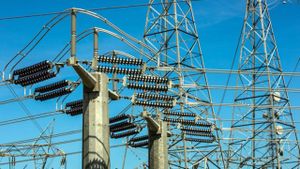The aftermath of the 2024 U.S. presidential election is sending ripples through the nation, sparking debates, fears, and uncertainties across various demographics. With Donald Trump reclaiming the presidency, America is bracing for significant shifts politically, socially, and culturally. The election results were met with dismay from some, particularly within marginalized communities, with concerns mounting about the potential impact on rights and freedoms.
One prominent voice echoing the fear and disappointment is within Indigenous communities, who express anxiety about the repercussions of another Trump presidency. Historical grievances from his first term, including attempts to undermine Native sovereignty and access to healthcare, breed uncertainty about the future. They recall the disheartening actions taken against Native American rights during his previous tenure, including the disestablishment of the Mashpee Wampanoag Tribe and undoing protections previously established by past administrations.
Angela Hoffman, a youth leader within the Indigenous community, commented on the historical challenges they have faced. “We are standing at the precipice of uncertainty, especially with the fear of voter suppression tactics returning. Many feel like their voices will be silenced again,” she expressed. Reports of intimidation at polling centers, such as bomb threats made to Native voters during the election, only add to this fear.
Meanwhile, the surge of misinformation around the election, bolstered by both foreign actors and some U.S. citizens, has raised alarms among democracy advocates. David Salvo, managing director of the Alliance for Securing Democracy, highlighted the vulnerabilities of the electoral integrity due to manipulated narratives and persistent claims of fraud, especially from figures like Trump himself. This creates fertile ground for division and distrust among voters.
Salvo pointed out the complexity of misinformation, saying, “It’s not just the propaganda from foreign nations but also the narratives perpetuated by influential figures within the U.S. They fuel division and chaos.” With so much uncertainty surrounding voting integrity, the trust deficit between communities and the electoral process is rapidly growing.
On the broader political front, pundits predict immediate changes under Trump's administration, particularly concerning social justice issues like abortion rights. Providers of reproductive health, such as Aid Access, reported unprecedented spikes in demand for abortion pills immediately after the election results were announced. Rebecca Gomperts, founder of Aid Access, shared, “We’ve never seen this before—the requests just keep pouring in. It’s as if people are preparing for what they believe will be their last chance for safe access to abortion.”
Within hours of Trump’s victory, her organization saw requests for abortion pills leap to over 5,000, resembling demand spikes not witnessed since the overturning of Roe v. Wade. This surge signals deep-seated fears about the future of reproductive rights, prompting many to stockpile medication.
Simultaneously, the fear isn't limited to just reproductive freedoms. LGBTQ+ individuals are on high alert, with healthcare providers specializing in gender-affirming treatments reporting significant increases in consultations. Dr. Crystal Beal from QueerDoc asserted, “Patients are increasingly concerned about their access to hormones—they naturally fear what policies may emerge under another Trump administration.”
Healthcare providers are advising patients to stock up on necessary medications, as many dread the possibility of restrictive policies on gender-affirming care for minors. Beal remarked, “People are prepared to safeguard their health as best as they can.” She emphasized the importance of the continued support networks for LGBTQ+ individuals during these troubling times.
Trump’s victory has reignited discussions around topics such as immigration reform, taxation, and foreign policy as well. Historically, Trump's presidency has been characterized by significant policy shifts and radical rhetoric, raising questions about America's place both domestically and globally. The incoming administration is expected to realign the nation's stance on various pressing international issues, including U.S. involvement with NATO and military assistance to Ukraine amid its conflict with Russia.
“With Trump back, we might see dramatic turns—his past statements raise concerns about how he will engage with allies,” warned political commentator Alexis Garcia. “It creates, for lack of a term, international whiplash.”
At the same time, many Democrats are left reflecting on how Kamala Harris, as Biden's replacement, was unable to maintain the party's momentum. Her campaign’s strategy to distance itself from the legacy of President Biden faltered, forcing voters to grapple with the balance of past successes against growing dissatisfaction.
Many pointed to Harris's struggle to connect with voters seeking change. An anonymous Democratic strategist noted, “There was this belief she could lead the party out of the shadows of Biden’s presidency, but the results showed otherwise—it was like she was shackled by the same issues he faced.”
Conversely, former President Trump remains undeterred by obstacles faced during his prior term, including multiple indictments and controversy arising from January 6. Despite it all, he maintains the loyalty and support of his base, securing another chance at influencing the nation’s political direction.
The election has left many American citizens feeling polarized. With newfound shifts raising questions about civil rights, social justice, and healthcare access during Trump’s impending term, people from various communities are gearing up for battles ahead. Activists, health providers, and community leaders are rallying together to prepare for what they perceive as urgent risks under the looming prospect of legislative changes.
Yet amid the uncertainty, it is the resilience of communities—particularly those historically marginalized—that reveals the passions and concerns of voters ready to organize and push back against the tide. Whether it’s Indigenous peoples digging deep to protect their sovereignty and rights, reproductive health advocates racing against the clock, or LGBTQ+ organizations bracing for tough challenges, one fact remains: the battles for rights and justice are far from over.
Observing the political currents, those affected express their determination, with messages of solidarity echoing across borders. “If we’ve learned anything from history, it’s our ability to come together and fight,” said Hoffman. “We will remain vigilant and continue to advocate for what we know is right. It’s not just about survival but thriving.”



